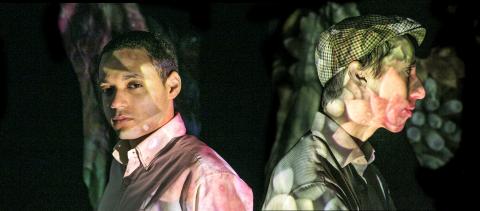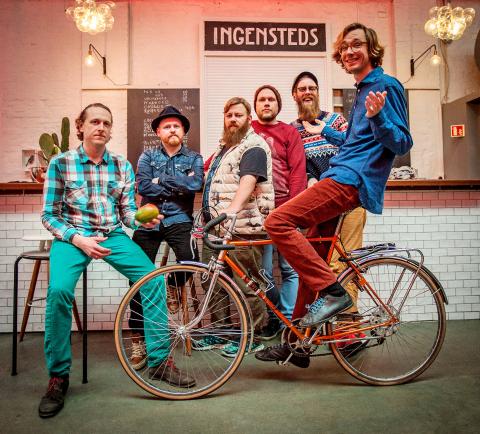Erlend Oye seems to be on a mission to defy not only genre, but geography as well. The 39-year-old Norwegian singer-songwriter is currently backed by an Icelandic reggae band (The Rainbows). He lives is Sicily and has lately begun writing songs in Italian, though for his latest album, Legao, which came out last October, the first release was a song with a Portuguese title, Garota (meaning “girl”), and the music video was shot in South Korea.
His musical trajectory has been just as erratic. Oye, pronounced “oh yay,” started out as an electric guitarist, and launched his first band, The Kings of Convenience, in London in the late 1990s. By the mid 2000s he was in Berlin, DJing and cultivating an electronic sound, notably hanging tight with Royksopp, a euro-dance duo of fellow Norwegians. At the same time, he formed a second band, The Whitest Boy Alive. The group, initially going for an electronic sound, it quickly settled into the light, coffee-shop friendly genre of indie-pop. Though that band officially called it quits last summer, Oye, who is sort of a dashing nerd on stage, has remained in indie-pop, now as a singer-songwriter leading his own band. His new album is full of soft, catchy tunes that sound like a highly talented musician who lives far from Brazil and is trying to remember what bossa nova sounds like. It’s music that has heard of the sunshine, but doesn’t know how to dance around in it. One can suppose that this is what they call reggae in Iceland.
Perhaps it’s no wonder that Oye’s music is popular locally, where indie rock crowds tend to be shy and almost never dance with confidence. Oye has been to Taiwan twice before, first in 2010 with The Kings of Convenience, then in 2011 with The Whitest Boy Alive. Both shows filled Legacy with several hundred fans, and both were produced by The Wall, which will host Oye’s next visit on Tuesday. This is Oye’s first Taiwan show performing under his own name.

Photo courtesy of SSIGHBORGGGG
■ Erlend Oye performs on Tuesday beginning at 8pm at The Wall, B1, 200, Roosevelt Rd, Sec 4, Taipei (台北市羅斯福路四段200號B1). Tickets are NT$1,500 in advance through www.books.com.tw.
SSIGHBORGGGG
Seoul’s indie scene is in many ways a mirror image of Taipei’s, only a little bit bigger. It’s a mix of locals and expats creating alternative energy in the margins, and the trickle of K-bands touring through Taipei is steadily growing.

Photo courtesy of the Wall
On Sunday, Revolver will host a gig by Ssighborgggg, a high-energy math rock project of two Americans living in Seoul. Sean Maylone plays keyboards, guitars and other electronics, and DeAnthony Nelson plays drums. The music seems to draw from all sorts of alternative electronic genres, ranging from experimental rock of Battles and the abstract electronica of Aphex Twin to nerdcore hip hop beats. It’s purely instrumental and always a bit cerebral, but on occasion, it achieves a manic, danceable energy.
In Korea’s music scene, Maylone is known both for his band and as a promoter. Contacted by e-mail, he says that he and Nelson started Ssighborgggg first, then LA-based, Asian-American hip hop producer Nosaj Thing e-mailed them through their band page “and asked us if we could set up something together.” He then started promoting shows under the label SuperColorSuper.
SuperColorSuper has so far put together shows for Nosaj Thing, Caribou, Gold Panda, Zach Hill (of Deathgrips), No Age, Yacht, Xiu Xiu and others. Ssighborgggg played all of these as one of the warm-up bands.
Maylone says the group plays instrumental music, because, “there should be no ‘face’ or ‘meaning’ that a voice guides a listener within our music. We provide the songs, so listeners should go to their own places and meanings as they experience it.”
They’ve also managed to carve out a niche for themselves in Korea.
“In Seoul we’re between a few punk bands and some on the electronic side —- it’s a place we feel at home, which might sound really strange for two Americans. We have lots of bands we regularly play and drink with and some tight producer and press friends,” says Maylone.
However, he adds that “it’s not a place to blow up as a weirdo band. It’s uphill in the music scene for all non-K-pop bands. We’ve seen our music catch attention in more exotic lands faster.”
In short, it sounds a lot like Taiwan.
■ Ssighborgggg plays with local acts Kishikan (既視感), BHD and Constant & Change (康士坦的變化球) on Sunday from 7pm at Revolver, 1-2 Roosevelt Road, Sec 1, Taipei City (台北市中正區羅斯福路一段1-2號). Tickets are NT$400 at the door.

William Liu (劉家君) moved to Kaohsiung from Nantou to live with his boyfriend Reg Hong (洪嘉佑). “In Nantou, people do not support gay rights at all and never even talk about it. Living here made me optimistic and made me realize how much I can express myself,” Liu tells the Taipei Times. Hong and his friend Cony Hsieh (謝昀希) are both active in several LGBT groups and organizations in Kaohsiung. They were among the people behind the city’s 16th Pride event in November last year, which gathered over 35,000 people. Along with others, they clearly see Kaohsiung as the nexus of LGBT rights.

Jan. 26 to Feb. 1 Nearly 90 years after it was last recorded, the Basay language was taught in a classroom for the first time in September last year. Over the following three months, students learned its sounds along with the customs and folktales of the Ketagalan people, who once spoke it across northern Taiwan. Although each Ketagalan settlement had its own language, Basay functioned as a common trade language. By the late 19th century, it had largely fallen out of daily use as speakers shifted to Hoklo (commonly known as Taiwanese), surviving only in fragments remembered by the elderly. In

Dissident artist Ai Weiwei’s (艾未未) famous return to the People’s Republic of China (PRC) has been overshadowed by the astonishing news of the latest arrests of senior military figures for “corruption,” but it is an interesting piece of news in its own right, though more for what Ai does not understand than for what he does. Ai simply lacks the reflective understanding that the loneliness and isolation he imagines are “European” are simply the joys of life as an expat. That goes both ways: “I love Taiwan!” say many still wet-behind-the-ears expats here, not realizing what they love is being an

In the American west, “it is said, water flows upwards towards money,” wrote Marc Reisner in one of the most compelling books on public policy ever written, Cadillac Desert. As Americans failed to overcome the West’s water scarcity with hard work and private capital, the Federal government came to the rescue. As Reisner describes: “the American West quietly became the first and most durable example of the modern welfare state.” In Taiwan, the money toward which water flows upwards is the high tech industry, particularly the chip powerhouse Taiwan Semiconductor Manufacturing Co (TSMC, 台積電). Typically articles on TSMC’s water demand